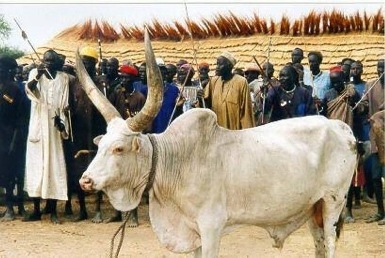Fresh wave of violence hits Rumbek as community leaders call for governor’s removal
August 28, 2014 (RUMBEK) – A fresh wave of inter-clan violence flared in Lakes state’s Rumbek Central county on Wednesday, leaving three people dead.

No suspects have been detained in connection to the killing of the teacher, named as Mayek Mabeny Reec. His son also suffered a gunshot wound to the thigh, but survived the attack.
The criminal investigation department (CID) confirmed the incident, saying that capturing suspects in revenge killings is becoming increasingly difficult as local communities are refusing to share information with authorities related to murder.
The officer also confirmed that 20 cows were also killed in the cross fire, with another 30 sustaining gunshot wounds, in a separate attack on Manyiel cattle camp.
He said members of the Boor section are suspected of carrying out the attack against the Panyon section.
In another separate incident on Wednesday, also in Manyiel, two unknown gunmen killed two people.
The victims were identified as Maker Malou Manyiel and Pajelo Apur-rap. An elderly man and one woman, the mother of paramount chief Marop Chagau, were also injured in the incident.
LEADERS HOLD CEREMONY
Meanwhile, spear masters (community leaders) in the remote village of Mabor-duang village, located in the south-west of Rumbek East county, conducted traditional practices calling on South Sudanese president Salva Kiir to remove Lakes state’s military caretaker governor, Maj-Gen Matur Chut Dhuol, who they blame for the deterioration in security across the region.
The group of traditional leaders slaughtered a bull as part of the ceremony.
Mamer Maker, who led traditional leaders in calling for the governor’s removal, said that state had fallen into lawlessness, with a sharp increase in killings and mistrust created by division within the leadership in Rumbek.
“[The] division of power have [brought] more death, sectionalism and nepotism [and have added salt in [the] state’s security downfall, threatening traditional leaders and students and closing all sources of local income,” said Maker.
“[The] flow of firearms and youth isolating [the] state government is becoming [a] threat. Where is [the] South Sudan government? Where is the son elected as president to hear us? God where are you to hear us. We need to [have] peace and unity in Rumbek,” he added.
PARLIAMENT APPROVES BILL
South Sudan’s national parliament has passed a bill recommending the removal of Dhuol.
Parliamentary speaker Daniel Magok Rundial accepted the motion put forward by Zechariah Matur Makuer, calling on Kiir to issue a decree for Dhuol’s removal.
South Sudan’s minister of national security, Obuto Mamur Mete, said Dhuol’s removal would be in the best interests of national security.
“In order that the state should be stable and security realised, the change in the state leadership should be an option as called for by the citizens of the state,” he said.
However, Dhuol has hit back at the parliament’s decision, accusing the central government of failing to bring national security under control.
He also blamed the president for the killing of thousands of Nuer citizens in the capital, Juba, after conflict erupted in mid-December last year, reigniting tribal tensions across the country.
Speaking to Radio Tamazuj on Tuesday, Dhuol said that insecurity is a general problem facing the entire nation and that it should not be the sole reason for his removal from office.
Dhuol further charged that if there is to be accountability it should start in Central Equatoria state, where he said thousands of civilians were killed at the height of the conflict.
“Thousands of people were killed in Juba, Jonglei, Upper Nile and Unity states. Was there any government official impeached?” he said.
(ST)
